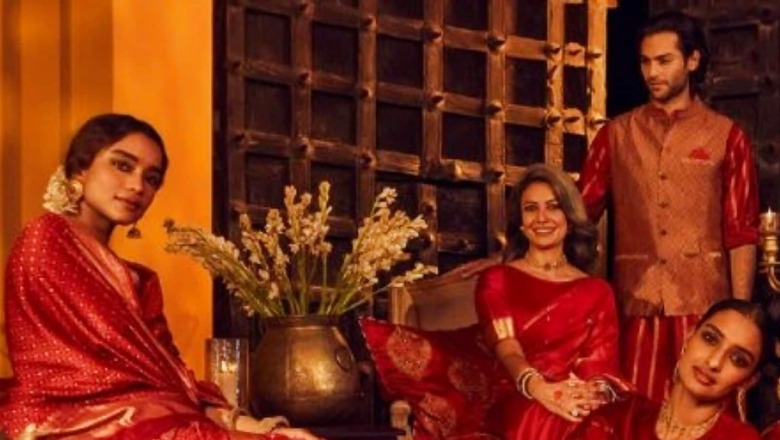
views
Freedom of expression has been much in the Indian news these last few weeks.
Dress and furnishings maker Fabindia came under fire for referring to Deepavali as ‘Jashn-e-Riwaaj’. Actor Kangana Ranaut faced a furore for saying the Independence we got in 1947 was ‘alms’ (bheekh) and that real freedom came only in 2014.
Comedian Vir Das had police cases filed against him for his monologue in Washington DC on ‘two Indias’. Munawar Faruqui says he will quit stand-up comedy after several of his shows were cancelled due to fears about protests.
Fashion designer Sabyasachi Mukherjee withdrew an advertising campaign for his line of ‘mangalsutras’ that featured surly women in lingerie and the Hindu necklace that signals marital status. Journalist Rana Ayyub wrote in The Washington Post that the film ‘Sooryavanshi’ was “dangerous’ and that ‘every third frame of the film is a bloodcurdling Islamophobic image”.
As any sufficiently logical person could tell us, freedom of expression finally distills down to the right to offend. As Salman Rushdie, who surely knows more on this matter than most of us, stated famously: “Without the freedom to offend, (freedom of expression) ceases to exist.” But people surely also have the right to be offended?
I believe in the efficiency of markets, as long as broad but effective government regulations exist to deter and punish the wayward. The same applies to a democratic society. Free speech too is subject to some freedoms and conditions, as laid down in our Constitution.
Fabindia and Sabyasachi should be free to advertise their wares as they think fit and in a way that they think would attract customers. But it is also entirely within the rights of some potential consumers to say: “Their message offends us. Don’t buy their products.” Everyone is free to buy a Fabindia kurta or a piece of Sabyasachi-designed jewellery. Just as any citizen has the right to protest peacefully in front of a Fabindia store.
Stakeholder activism is an integral part of markets, and corporations include customers in their definition of ‘stakeholders’. One could cite many examples of ads being withdrawn by major brands after a consumer backlash, but two will suffice.
In 2009, Bacardi ran an ad that seemed to imply that ‘ugly women’ would look more attractive if men had a few pegs of the white rum. In 2017, a Pepsi ad showed a white woman offering a can of the beverage to a policeman watching over a peaceful street protest. The protestors cheer her and the policeman grins appreciatively. Black Lives Matter activists felt that the ad trivialised their movement against police brutality. Both companies decided that it would be better for businesses to apologise and withdraw the ads.
These principles apply in India too. And it is up to the brands to decide how to respond to criticism, based on their understanding of the market.
Two groups are at war every day on Indian social media. Some Indians spend their waking hours abusing Narendra Modi, and the rival group spends 18 hours a day praising every move that Modi may or not have made. Both sides often make wild claims and are rude and cruel. I support the freedom of expression of both sides while retaining my right to laugh at or be annoyed by their opinions.
But questions remain. Why does the recent Tamil hit film, based on a true incident, change the religion of the real villainous police officer from Christian to Hindu, and de-Hinduise the names of a few of the victims? Will Sabyasachi ever design hijabs and run a campaign with women dressed only in hijabs and undergarments?
‘Liberals’ are upset because in Sooryavanshi terrorists offer namaaz before they go off to kill innocents. But it is an irrefutable fact that jihadis believe they are doing Allah’s will and seek His blessings before setting off on their ghastly missions. In fact, several characters and scenes in Sooryavanshi strongly refute the easy generalisation that Indian Muslims support acts of terror. The villains are even given back-stories where they lost family members in riots, which led to their thirst for revenge on Hindustan. As the film’s director Rohit Shetty has noted, no questions were asked about religion and caste when he had Hindu villains in all his other films. And those men had no back-stories to even remotely explain their venality.
I have watched the ‘objectionable’ Munawar Faruqui videos. Humour is of course the ultimate test of freedom of speech. But to joke about the 59 human beings — many of them women and children — who were burnt alive at Godhra is not merely tasteless; many comedians across the world have made their fame and fortune from being tasteless. Such a gag could inflame a few hotheads enough to put some more innocent lives in danger. And we should feel exactly the same way if someone made fun of the Muslims who died in the post-Godhra riots. The right to offend comes with some boundary conditions.
Much of the ‘liberal’ outrage that we see currently seems to be highly selective. Faruqui is being portrayed as a victim of ‘Islamophobia’, but if say a Brahmin called Mahesh Tiwari cracked a ‘burning train’ joke about the Godhra incident, would he not have faced the same criticism that Faruqui faces?
‘Islamophobia’ has become such a broad-brush term used at the drop of a hat, that one doesn’t even know what it means any more.
I can’t remember any liberal condemnation of Haji Yakoob Qureshi, the Bahujan Samaj Party leader from Meerut, when he announced a Rs 51-crore reward for the men who killed journalists working for the French satirical magazine Charlie Hebdo. Would such a condemnation have been Islamophobic?
Last week, the Toronto District School Board cancelled a talk by Nadia Murad, an escapee from the Islamic State’s sex slavery and a Nobel Peace Prize winner. Apparently, Murad, a Muslim victim, talking about Islamist terrorism could ‘promote Islamophobia’ and ‘offend’ Muslim students. Indian liberals cheered the American academics who organised the Dismantling Global Hindutva conference, held ironically to coincide with the 20th anniversary of the 9/11 attacks by Al Qaeda. Yet, they — and the same American intellectuals — have not even hinted that the Toronto Board’s decision could be problematic.
Indian liberals pick and choose their outrages. They stay silent when two sadhus and their driver are lynched by a mob in Maharashtra with the police looking on helplessly, when a Hindutva leader is killed after public rallies openly call for his beheading, or when armed agitators try to raise the Khalistan flag at Red Fort on our Republic Day.
This blinkeredness is not serving any true liberal clause in any real sense. Let the same logic be applied uniformly to all — to both people who need their rights protected and to those who need to be denounced. Freedom of expression is too precious a commodity. Its myopic adulteration is dangerous for our society.
The writer is a former editor of ‘Financial Express’, and founder-editor of ‘Open’ and ‘Swarajya’ magazines. The views expressed in this article are those of the author and do not represent the stand of this publication.
Read all the Latest Opinions here

















Comments
0 comment